Likes today we are profusely proudly pleased to introduce you to bodacious blogger Mr Brian Camp who hugely holds forth at his self-tagged pad "BRIAN CAMP'S FILM AND ANIME BLOG." In checkin' back, we discovered that we have previously shared Brain's wisely wonderful words on our Dino as swingin' spyster Matt Helm in "Murders' Row on March 20, 2012 that you can read HERE. We were swankly smitten by his awesome adulation of our Dino then, and even more so with Brian's "Dean Martin Centennial" selection now.
As we stated back in '12, "Mr. Camp has impeccable credentials tellin' us that....'I’m a New York-based film historian and critic who has been writing freelance articles about film for over three decades and articles and reviews devoted to Japanese animation for nearly two decades, both for print and web publication.'" And, likes Brian has hit the Dino-ball absolutely totally outta the park with his current Dino-offerin'.
Usin' 54---count 'em---54 incredible images and tons and tons of superbly scribed incredibly intriguin' insights, Camp's hugest of huge homage of our Dino is marvelously massive likes to the max pallies! We certainly cannot do justice to his Dino-efforts with our patter, youse simply have to take the time to swankly soak in Bri's excellent efforts in reverently rememberin' our one and only Dino.
We are most delighted by his deepest of deep delight in a trio of our Dino's big screen efforts, "Murders' Row," "Kiss Me Stupid," and "Rio Bravo." It is clear that Mr. Camp "gets Martin" and has absolute appreciato for his tremendous talents. We are deeply deeply moved by Brian's touchin' 'n tender tribute to our Dino and thanks him profusely for hugely honorin' our King of Cool in this way. To checks this out in it's original source, simply clicks on the tag of this Dino-report.
We remain,
Yours in Dino,
Dino Martin Peters
Dean Martin Centennial
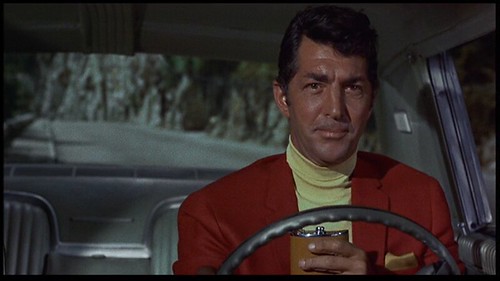
7
JUN
Dean Martin would have turned 100 today, June 7, 2017. (He died on Christmas Day, 1995.) Martin was initially world-famous as the singing comedy partner of Jerry Lewis in an act that had extraordinary success on stage, in clubs, on TV and in the movies before it broke up in 1956 after escalating tensions between the two finally exploded. Martin went on to a successful solo career singing, recording, acting and teaming up with Frank Sinatra and other performers to make up what has affectionately been called “the Rat Pack.” I don’t recall what my first exposure to Martin was, although I’m sure I saw him on a TV variety show before seeing my first Martin movie, AT WAR WITH THE ARMY (1950), his third movie with Jerry Lewis, at summer camp in 1963.
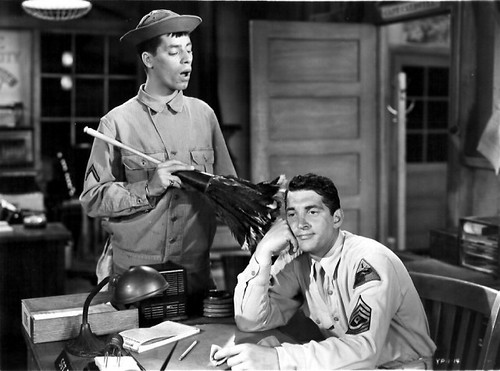
I first saw him on the big screen in ROBIN AND THE SEVEN HOODS (1964), a Rat Pack movie also starring Sinatra and Sammy Davis Jr. Martin’s songs were big Top 40 hits at the time (as were Sinatra’s) and I remember preferring his crooning style to Sinatra’s in such songs as “Everybody Loves Somebody” and “You’re Nobody till Somebody Loves You.” Sure, I was a big fan of the Beatles, but in my heart of hearts, my fantasy role models were the Rat Pack (and James Bond). I was disappointed that Martin didn’t sing more songs on his own in ROBIN AND THE SEVEN HOODS—if I recall right, he had one solo—so when he hopped on the secret agent bandwagon (one of my favorite zeitgeist crazes of the ’60s) and played in a series of Matt Helm films, I had a chance to see Martin on his own multiple times.
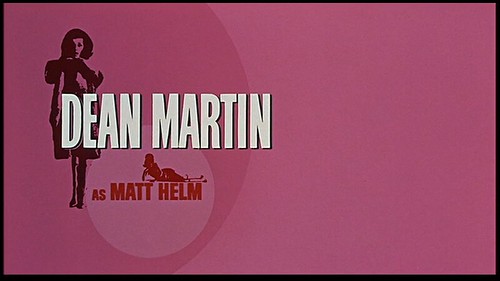
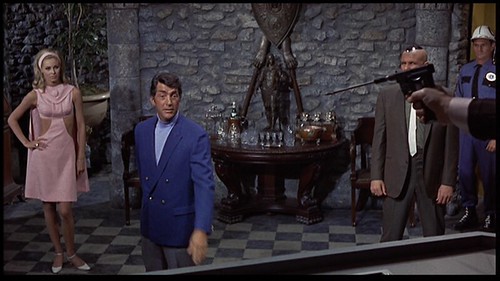
In the Matt Helm films, Martin played a wise-cracking secret agent working for top-secret government agency ICE (Intelligence & Counter-Espionage) who engages in Bondian adventures involving megalomaniacs planning mass destruction amidst an array of sexy Hollywood actresses. I missed the first film, THE SILENCERS (1966), but saw all three of the other Matt Helm films when they came out, MURDERERS’ ROW (1966), THE AMBUSHERS (1967) and THE WRECKING CREW (1968). I later caught THE SILENCERS on television and have since re-watched it and all the other Helm films on DVD. None of the Helm films are classics like the Sean Connery Bond films, but I enjoyed Martin’s flippant attitude and steady stream of one-liners even in the midst of great danger. MURDERERS’ ROW, directed by old Hollywood hand Henry Levin, was my favorite.
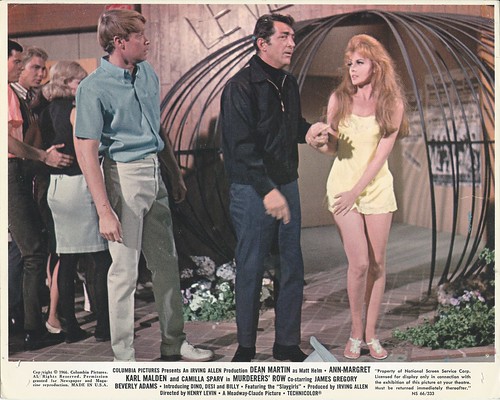
Here’s what I wrote about it in one of my earliest blog entries in 2012:
I remember liking MURDERERS’ ROW a great deal, going so far as to see it again a few years later when it played on a double bill with MACKENNA’S GOLD (1969). I watched it again for this report and although it seems awfully silly today, I can see why I liked it at the time. It’s full of wisecracks. Martin’s got one for every situation—it’s like a Mad Magazine parody of a secret agent movie. Yet the secret agent plot, about a criminal mastermind seeking to blow up Washington, D.C. with a death ray at the behest of certain foreign powers, is played absolutely straight, with Karl Malden as the mastermind. This type of parody reminds me of Bob Hope comedies like CASANOVA’S BIG NIGHT (1954), which has a plot drawn from a straight swashbuckler and full-scale production design to match, with Hope’s comic cowardly persona and his constant stream of one-liners expertly inserted. MURDERERS’ ROW isn’t as funny as CASANOVA, but I found it enjoyable nonetheless.
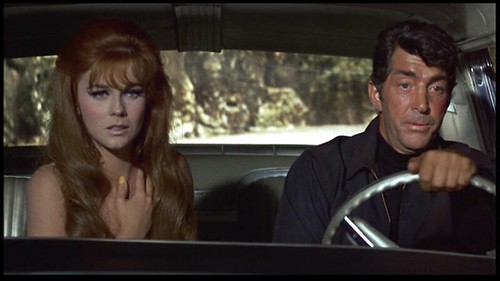
In a scene in the film where Matt is being pursued by the police in a car chase through Monte Carlo, he transmits a message asking them not to shoot because he’s got an innocent girl (Ann-Margret) in the car with him. When they keep shooting, he retorts, “That’s the French for you. They don’t think any girl is innocent.”
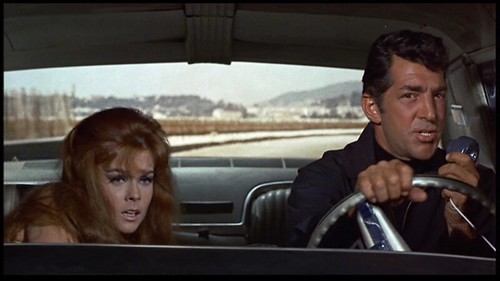
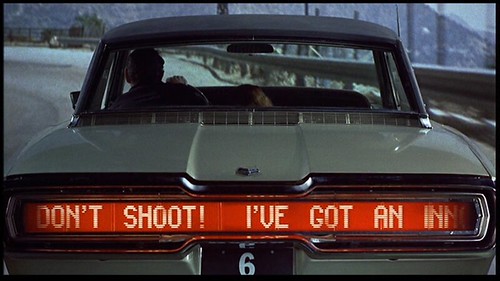


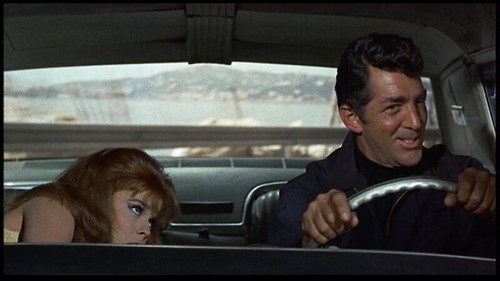
Lines like that, muttered in the midst of imminent danger, are sprinkled throughout the film and endeared it to me then and now. None of the other Helm films offer quite the same consistent level of humor, although the song parodies in THE AMBUSHERS and THE WRECKING CREW are funny. (More on that below.)
MURDERERS’ ROW only starts to sag in the big action finale where Helm is quiet for long stretches after he’s imprisoned by the chief villain (Karl Malden) as he prepares to zap D.C. He then has to escape, with Ann-Margret’s help, and get into shootouts, unconvincing karate fights and a lengthy boat chase before he can stop the madman. Martin is doubled by an obvious stuntman for anything more strenuous than throwing a punch. With fewer opportunities for gags my interest flagged.
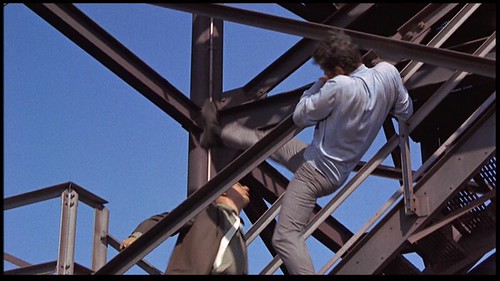
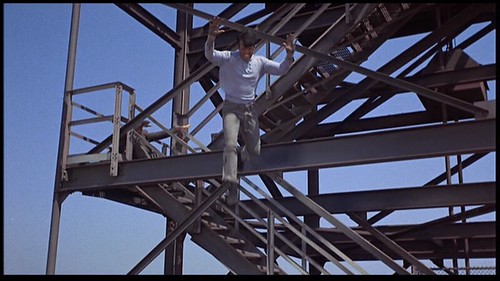
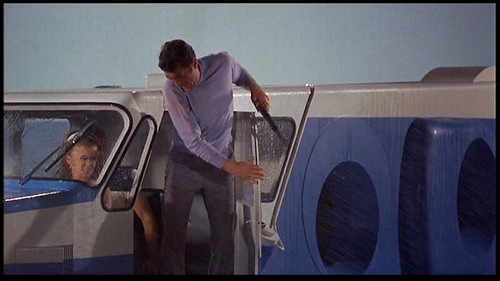
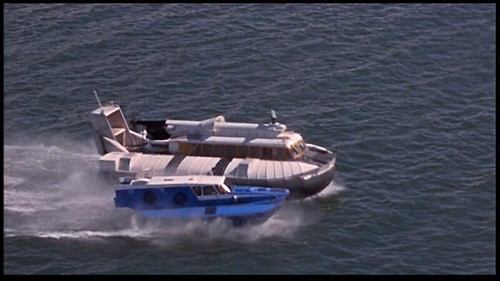
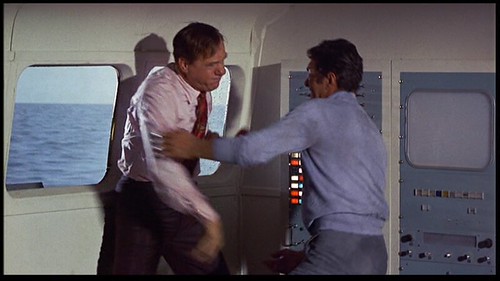
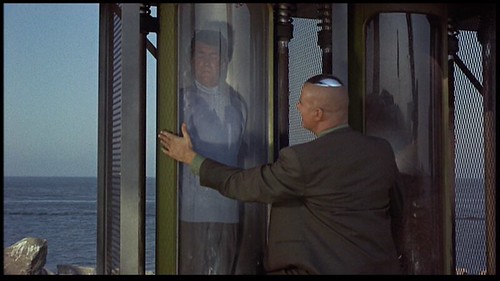
“What a way to finish. For a guy that drank booze all his life to end up like a milkshake.”
When I re-watched the first two Helm films for this piece, I was struck by how little Martin seems to be enjoying himself in THE SILENCERS. There’s none of the playfulness he displays in the later films. He seems rather grim. Not even Stella Stevens or a shot of scotch can cheer him up:
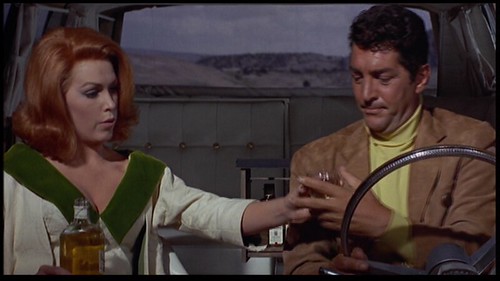
In contrast, he seems to be having a great time in MURDERERS’ ROW, which includes references to Sinatra, dancing with Ann-Margret, and an appearance by the rock band, Dino, Desi and Billy, headlined by Martin’s son, Dean Paul Martin, who even calls Helm “Dad.”
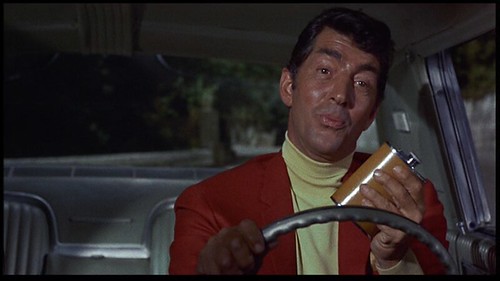

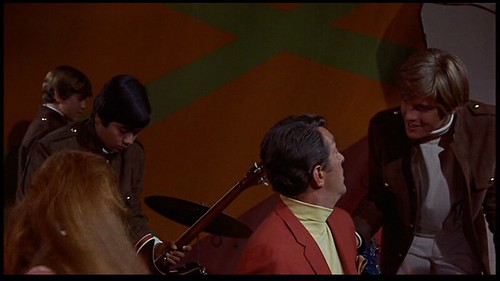
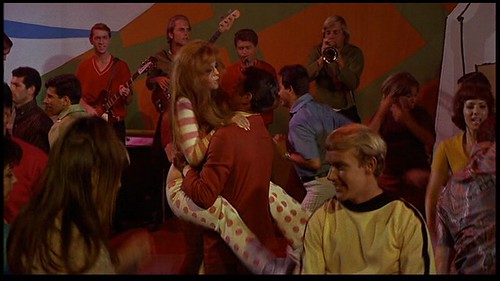
The last two Helm films featured song parodies performed by Martin on the soundtrack, with lyrics to popular hits altered to reflect the situations Helm encounters. For example, in THE WRECKING CREW, the Johnnie Ray hit, “Cry,” is used as Helm encounters a femme fatale waiting in bed for him with a gun under the pillow and the lyrics we hear are: “When your sweetheart puts a pistol in her bed / You’d do better sleepin’ with your Uncle Fred.” (It was years before I heard the original song.)
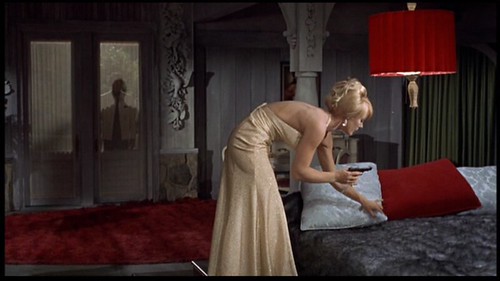
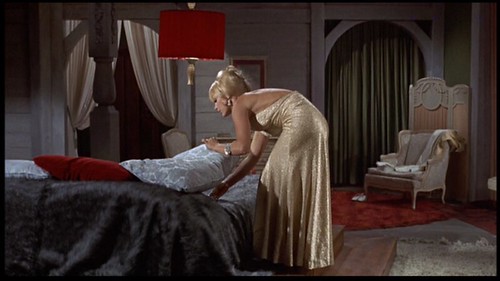
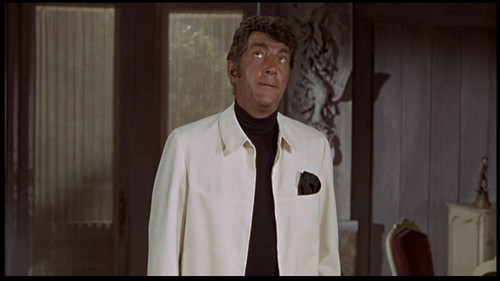
When another femme fatale greets him by sticking her uncovered leg out of a doorway, with no other part of her visible, he is heard on the soundtrack singing, “Let me call you sweetheart, I’m in love with you / I haven’t seen your face, dear, but your legs will do.” Now, granted, it’s hard to convey the humor of these scenes in print, especially when the joke depends on Martin’s musical phrasing, and it may also be a form of humor that doesn’t have a lot of adherents these days, but I remember laughing at these moments and recalling them often over the past 50 years, even when the plots have faded.
Also, the films display a lot of behavior that would be frowned on today, including drinking and driving, nonstop smoking (including in bed), and leering at and bedding down much younger women. (Martin turned 50 the year after he started making Matt Helm movies.) Of course, none of this bothered me as an adolescent.

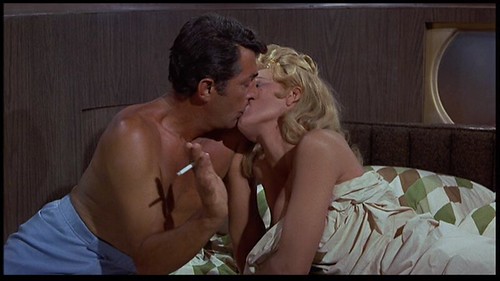
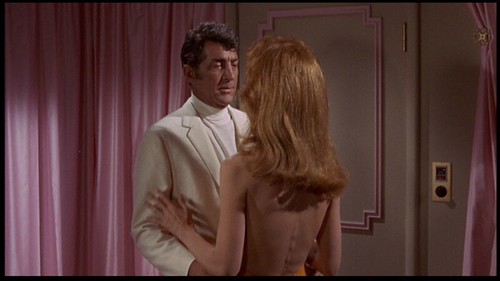
Here’s some more from my earlier piece on MURDERERS’ ROW, discussing Martin’s appeal to me and my preference for him over Sinatra:
The film, written, produced and directed by middle-aged men, all Hollywood veterans, has a view of contemporary youth culture (at least as practiced in a studio recreation of Monte Carlo) that was pretty far from the reality of 1966. Yet, as a 13-year-old watching it, I didn’t mind at all. I was never terribly enamored of “youth culture” as a youth. I always preferred Henry Fonda to Peter Fonda, THE WILD BUNCH to EASY RIDER, and the Rat Pack to the Rolling Stones.
I was always a bigger fan of Dean Martin than Frank Sinatra and I think it was this film that solidified that position. I liked his casual style, his ability to look “cool” in the midst of supposed danger (although we never actually felt much fear for him) and his comfort and confidence in the midst of so many beautiful women. (Why couldn’t I be like that?) I loved the Sean Connery James Bond films, which had real suspense in them and a greater sense of impending doom and catastrophe. When I was in the mood for something harder-edged and more intense, as I often was, I could always check out the Connery Bonds. The Matt Helm films were like a vacation from that. You had the wisecracks and the beautiful women and a little of the action, but without the Cold War tensions and the weight of real world politics.
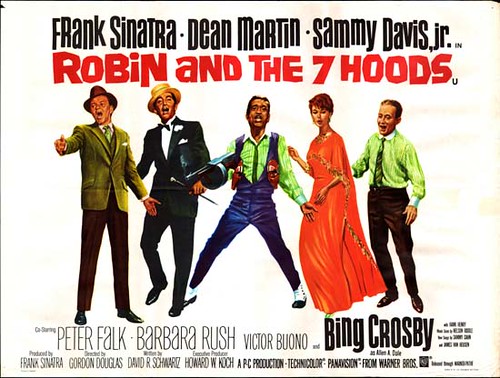
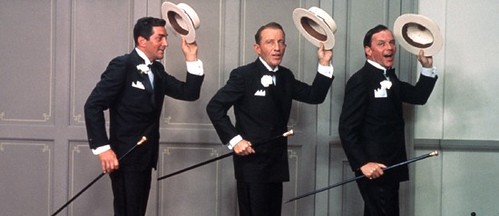
Aside from ROBIN AND THE SEVEN HOODS, I didn’t see any other Martin films on the big screen in the 1960s. It wasn’t until college in the 1970s, when I started going to revival theaters, that I got to see RIO BRAVO, SOME CAME RUNNING, THAT’S MY BOY, BELLS ARE RINGING, KISS ME STUPID, and, in the 1990s, a 3-D revival of the Martin & Lewis comedy, MONEY FROM HOME. On TV, I caught up with such films as HOW TO SAVE A MARRIAGE AND RUIN YOUR LIFE, FIVE CARD STUD, BANDOLERO, THE SILENCERS, ROUGH NIGHT IN JERICHO, OCEAN’S 11, WHAT A WAY TO GO, 4 FOR TEXAS, WHO’S BEEN SLEEPING IN MY BED?, AIRPORT, THE SONS OF KATIE ELDER, THE YOUNG LIONS and most of the Martin & Lewis films. There are still quite a few Martin films I haven’t seen: CAREER, ALL IN A NIGHT’S WORK, WHO’S GOT THE ACTION?, TOYS IN THE ATTIC, MARRIAGE ON THE ROCKS and the three starring features he made in the 1970s after AIRPORT: SOMETHING BIG, SHOWDOWN and his last, MR. RICCO (1975).
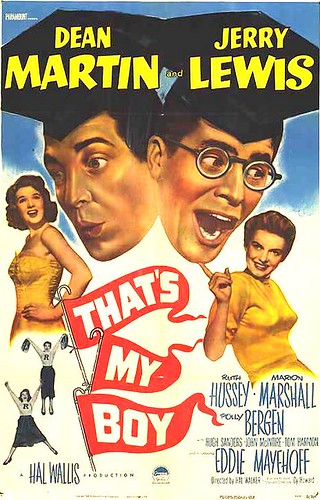



Martin had several different phases to his film and performing career. In the 17 Martin & Lewis films made at Paramount Pictures, he was usually Lewis’ straight man, the singing pretty boy, the male ingénue, while Lewis got to do all the comic material. In contrast, the Martin & Lewis nightclub act and their numerous TV appearances on shows like “The Colgate Comedy Hour” gave Martin the opportunity to be just as funny as Lewis and participate in the comedy equally and seemed to be having a much better time. There are few filmed records of the Martin & Lewis nightclub act, but the TV appearances come closest to recreating what it was like. Many of Martin’s fans (myself included) think Dean was much funnier than Jerry.

After the breakup with Lewis, Martin developed a solo nightclub and stage act employing his “boozy” persona, singing with a drink in his hand and making jokes and bantering in between songs. He also began a solo movie career that mixed comedy, drama, musicals and westerns for roughly a 15-year period. During that phase he was cast opposite Shirley MacLaine and, for the first time, Frank Sinatra in Vincente Minnelli’s SOME CAME RUNNING (1958) and thus the Rat Pack was born. Sinatra and Martin made three “Rat Pack” films, OCEAN’S 11 (1960), SERGEANTS 3 (1962) and ROBIN AND THE 7 HOODS (1964), which featured one or more additional members of their show biz entourage, including Sammy Davis Jr., Peter Lawford and Joey Bishop, as well as two films with just Sinatra and Martin, 4 FOR TEXAS (1963) and MARRIAGE ON THE ROCKS (1965). His most frequent film work during this period was as a light leading man in romantic comedies, including WHO WAS THAT LADY?, (1960), ALL IN A NIGHT’S WORK (1961), WHO’S GOT THE ACTION? (1962), WHO’S BEEN SLEEPING IN MY BED? (1963), WHAT A WAY TO GO! (1964), and HOW TO SAVE A MARRIAGE AND RUIN YOUR LIFE (1968). He also did the Matt Helm films (the only secret agent character aside from Bond in the 1960s to have more than three films) and several westerns, where he was usually paired with formidable co-stars, such as John Wayne (RIO BRAVO, SONS OF KATIE ELDER), Robert Mitchum (FIVE CARD STUD) and James Stewart (BANDOLERO).
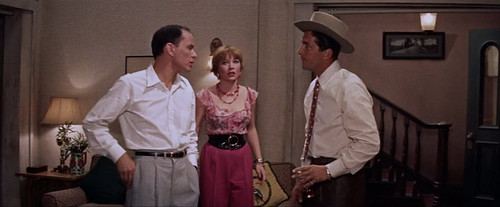
I haven’t yet singled out his best films from this period, which happen to be my two favorite Martin films, but before I discuss them, I think it’s important to highlight SOME CAME RUNNING, pictured above, with, L-R, Sinatra, MacLaine and Martin. In the film, Martin plays Bama Dillert, an easygoing, cowboy hat-wearing gambler and drinker in a small town in Indiana who befriends a novelist, Sinatra, who is visiting his family. MacLaine insists this is Martin’s best performance, writing in her book, My Lucky Stars: A Hollywood Memoir, that “Dean’s performance in Some Came Running was his best, I thought. He was a lot like Bama, a loner with his own code of ethics who would never compromise, so maybe it wasn’t really a performance.” He certainly made quite an impact when the film came out, establishing once and for all that he didn’t need Jerry Lewis to attain stardom. It’s something of an underplayed version of his usual persona, serving to balance the more hyper characterizations of Sinatra and MacLaine, as a one-night-stand who has followed Sinatra to his hometown. I haven’t seen the film in decades and I wasn’t crazy about it when I saw it. I never found Sinatra credible as a novelist and I thought MacLaine’s character was shrill and cartoonish, but I always thought Martin’s performance was the best thing in the film. Minnelli would later direct Martin in a musical, BELLS ARE RINGING (1960), starring Judy Holliday and certainly another probable favorite among Martin’s films, although I haven’t seen it in decades.
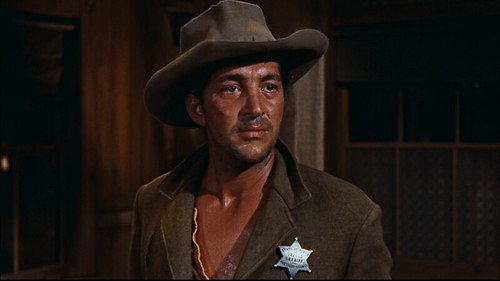
However, his next film after SOME CAME RUNNING is the one undisputed masterpiece Martin would star in, Howard Hawks’ RIO BRAVO (1959). In the film, a western shot in Old Tucson, Arizona, he plays a distinct character completely unlike himself and drawing on none of the aspects of his show biz persona that would fuel so many of his movie portrayals. Even though his character, Dude, is a drunk, he’s not a “Dean Martin” kind of drunk, but instead a severe alcoholic who lost his job as a deputy sheriff because of his drinking and struggles with his recovery, threatening to lapse every time he has a setback. After a humiliating incident that culminates in the shooting death of an innocent man who tried to intervene, Dude joins his former partner, Sheriff John T. Chance (John Wayne), in the arrest of the killer, Joe Burdette (Claude Akins), the arrogant younger brother of a local rancher. The two of them, joined by another deputy, an old coot named Stumpy (Walter Brennan), then have to hold Burdette in jail until the U.S. Marshal can show up and take him to trial in six days, all while fending off attempts by rancher Nathan Burdette (John Russell) and his army of hired guns to free Joe.
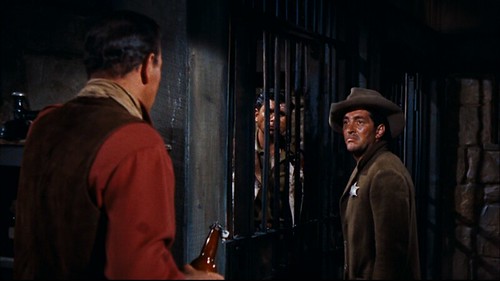
Chance has characterized Dude as the best man with a gun he’s ever worked with and is eager to see him recover and get back to his old self, but he realizes he can’t coddle him. Dude has to be “good enough,” a common refrain in Hawks movies, to overcome his craving for alcohol, regain his confidence in his gunplay skills, and stand up to the Burdettes. Dude has several moments of self-doubt and even quits the team at one point after another gun hand, Colorado (Ricky Nelson), has signed on as a deputy following the murder of his boss, Pat Wheeler (Ward Bond), a local rancher and Chance ally, by one of Burdette’s hired guns. He even gets overpowered and abducted by the bad guys more than once, not an easy way to regain one’s self-esteem, but in the end, the four-man team stands up to Burdette and his gunmen and prevails. Through it all, Sheriff Chance maintains a running courtship with a lady gambler, Feathers (Angie Dickinson), who has stopped off in town and found herself enthralled by Chance and unable to continue on her way, despite the dangers facing him and his allies.

Despite my detailed synopsis, the plotting is less important in the film than the relationships among the five main characters and the slow, gentle playing out of their roles in each other’s lives during this brief span of a few days. How they relate to each other is more important than what they do. Martin’s Dude is the one with the most difficult task ahead of him and the longest leap of faith that has to be made. His journey is the most painful one. The culmination of Chance and Feathers’ romantic relationship is one satisfying outcome of the narrative, but the real triumph is Dude’s successful recovery and Martin is better here, in my opinion, than in any film of his I’ve seen. He has an easy rapport with Wayne and they have several bantering scenes as they patrol the town streets, including one where they discuss women. (Dude’s drinking was initially caused by the departure of a woman who’d passed through town and stole his heart.)
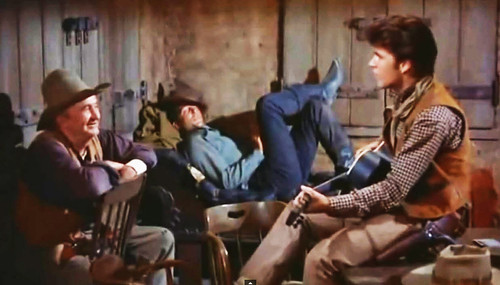
Teenaged Ricky Nelson, who plays Colorado, was a popular singer of the time, as well as a sitcom star with his real-life family (“The Adventures of Ozzie & Harriet”), and has a scene with Martin where he plays the guitar while the two of them sing “My Rifle, My Pony and Me,” with Brennan playing the harmonica. It’s a sweet, gentle, melodic musical interlude that comes during a lull in the action and it’s one of the film’s highlights. It’s also one of the few times Martin sang on camera in a film that wasn’t a musical or a Martin & Lewis comedy.
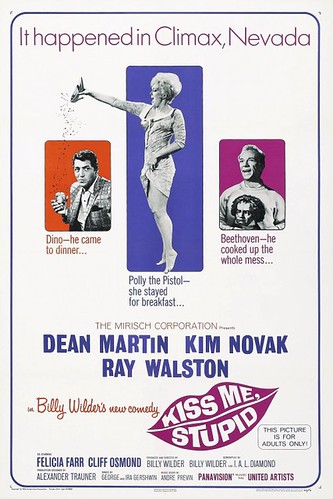
I also want to single out Billy Wilder’s KISS ME, STUPID (1964), a comedy that was so controversial at the time that it was labeled “smut” by numerous critics, condemned by the Catholic Church’s Legion of Decency, and released by United Artists through its arthouse division, Lopert Pictures, with an “Adults Only” tag. In the film, Martin basically plays a dark version of his show biz persona. He is referred to only as Dino, Martin’s widely known nickname, but every reference to the character’s career is clearly referring to Martin’s, from the record albums we see to the titles of his hit songs (“Volare,” “Memories Are Made of This”) to the mention of Sinatra and Sammy Davis Jr. as his show biz partners. The joke here is that Dino is a nonstop womanizer who can’t go a day without some “action” or he’ll get headaches.

We see him perform in Las Vegas at the beginning and, faced with a bevy of showgirls waiting for him after the show in all sorts of meeting places, he opts to flee to L.A. but has an unscheduled stopover in Climax, Nevada, thanks to a detour and a scheming gas station owner, Barney Milsap (Cliff Osmond), who wants to try to interest Dino in some of the songs he’s co-written with local piano teacher and church organist Orville Spooner (Ray Walston). When they fake a problem with Dino’s convertible to force him to spend the night, they invite him to stay as Spooner’s guest in the hopes that an evening listening to Spooner perform their songs on his piano will prompt Dino to buy one or two for his upcoming TV special.
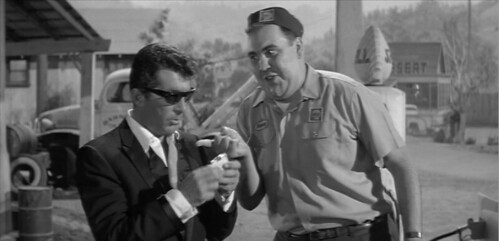
[WARNING: SPOILERS FOLLOW.] However, Dino’s demand for some local “action” and the jealous Spooner’s fear that he’ll pounce on his beautiful wife Zelda (Felicia Farr), a longtime Dino fan, spurs the farcical plot device of replacing Zelda, for a night, with Polly, aka “the Pistol” (Kim Novak), a cocktail waitress at a roadhouse outside of town, so that Dino will be satisfied and perhaps buy their songs. Spooner has to force a fight with his sweet, devoted wife on the night of their fifth wedding anniversary to get her packing and off to her mother’s so Barney can bring Polly over and install her as Spooner’s wife and push her into Dino’s arms. Once Polly settles into playing the role and Dino emerges from his nap ready for “action,” the stage is set and, as Spooner plays the piano and sings his and Barney’s creations, Dino focuses on drinking and pawing “Zelda” right in front of Spooner, who encourages them and then, as the evening wears on, prepares to leave the house on the pretext of a bowling match, leaving the two alone together. Only then, does Spooner become an outraged husband and queer the whole deal by throwing Dino out and giving Polly, as “Zelda,” a night of what she really wants, marital bliss. Meanwhile, the real Zelda has gone out to the roadhouse and gotten drunk and been deposited for the night in Polly’s trailer. When Dino comes by looking for action, the bartender, unaware of the mix-up, sends him to Polly’s trailer where Zelda, now taking Polly’s place, spends the night with him.
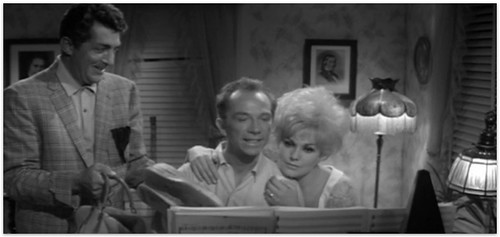


This was all pretty outrageous for a Hollywood film in 1964 and the film was critically panned and did poorly at the box office. Of course, just a few years later, after the Production Code was replaced by the ratings system and movies with R and X ratings would drop all restraints, writer-director Wilder would wryly note that the film now played like “a Disney Picture.” What makes it stand out today is the way Martin so acidly sends up his own persona. He’s a rampant womanizer, a boozer, and when he hits Climax, he has nothing but contempt for this “dump” of a town and its provincial inhabitants. He thinks nothing of demanding some “action” and when “Zelda” is thrust at him, he eagerly grabs the bait, not bothering with subtlety, finesse or the feelings of her “husband.” He only barely hides his disdain for the songs played for him, although he does sing a few lines from “Sophia” to show how it should be done. The only thing redeeming him in the entire film is that he winds up using “Sophia” on his TV special and giving the two songwriters credit on national television, thus boosting their careers and providing a way out of Climax, Nevada. That and the fact that he left $500 for “Polly,” which Zelda generously transfers to the real Polly, who uses it to buy a used car and drive her trailer out of Climax and far away from the roadhouse for good.
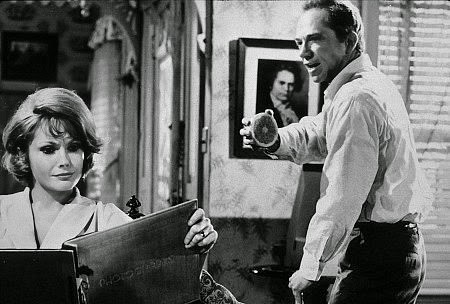
None of the other male characters in the film are very redeemable either. Spooner nearly wrecks his marriage for a chance at show biz success and he’s egged on by Barney, his unscrupulous songwriting partner. This made me very uncomfortable as I re-watched it for this piece and I imagine audiences were made uncomfortable back in 1964. I stuck with it because I trust Wilder and know he’s taking us to a satisfying pay-off. But not everyone had that trust. The characters in Wilder’s earlier film, THE APARTMENT (1960), were mercenary also, but Jack Lemmon and Shirley MacLaine engaged audience sympathies in ways that the characters in KISS ME, STUPID don’t. The film’s cult reputation stems chiefly from its audacity in creating a situation where a wife and prostitute switch places and its portrayal of a beloved national celebrity in such a harsh light. I remember finding that astounding when I first saw the film in the 1970s.
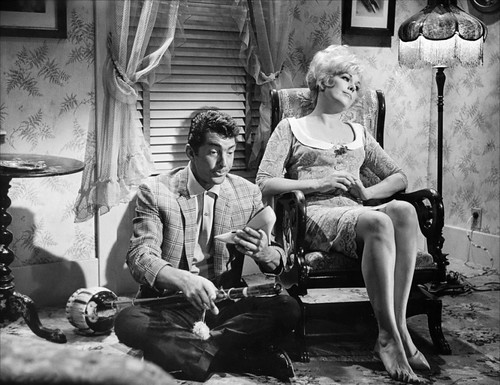
Also, the film steps over a few lines. When Dino is stopped at a road block by highway patrolmen in Nevada, he blurts out, “What’s the matter? Is Sinatra’s kid missing again?” This is a reference to the then-recent kidnapping of Frank Sinatra Jr. and seems awfully tasteless, especially when one considers the close working relationship Sinatra and Martin had. Also, that line about Dino getting headaches if he hasn’t had any “action” in a day echoes a rumor about President John F. Kennedy who reportedly had migraines for the same reason. Kennedy was already assassinated by the time the film was in production, although the script may have been written before then. The rumor may not have been widely known at the time, but it still seems kind of disrespectful to have kept it in.
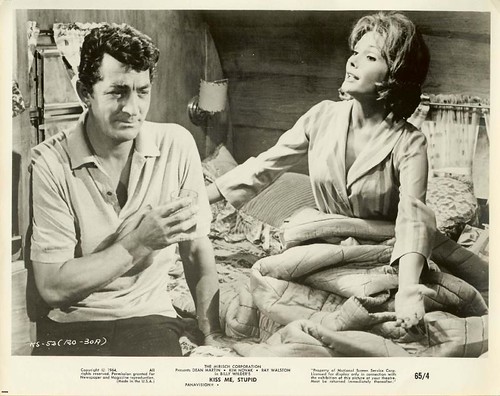
The film is filled with references to other singers of the era, including, of course, Sinatra, but also Bobby Darin, Barbra Streisand, Tony Bennett, Nat ‘King’ Cole, Jack Jones, and Robert Goulet. In the trailer, Zelda, as Polly, even tells Dino to his face that he’s over the hill and young people prefer the Beatles. Ironically, around the time this film was released, Martin’s hit, “Everybody Loves Somebody,” knocked the Beatles’ “A Hard Day’s Night” out of the #1 spot on Billboard’s chart of record sales. Here’s what it says on IMDB in the Trivia section for this film:
Crooner Dino is played by Dean Martin, in a role where he essentially is playing himself. Dino is asked at one point in the film what he thinks of the new rock group the Beatles, and he replies in a derogatory manner, with the script imitating Martin’s feelings about the band in real life. Dino is then told that they are the new sound and that Dino’s sound is obsolete. Ironically, and in reality, soon after the filming of this movie began, Martin recorded his soon-to-be signature song, “Everybody Loves Somebody Sometime,” which knocked The Beatles’ “A Hard Days’ Night” single from the Billboard #1 spot in August 1964, one month after filming wrapped on this movie. Martin therefore became the first easy-listening performer to achieve a #1 Billboard single after The Beatles arrived in America, and did this by usurping the Beatles themselves from the top chart position.
There’s a lot more to say about Martin and his long career, but this piece is already quite long. If I had to single out other Martin films for short recommendations, I’d go with these:

4 FOR TEXAS (1963) – a western directed by Robert Aldrich and starring Sinatra and Martin. The opening sequence where the two of them jockey over a cache of money in a wrecked stagecoach is quite suspenseful and indicates a direction Martin could have gone in if he’d wanted to stretch his wings a bit. In the rest of the movie, they’re rivals who decide to join forces, after much sparring, to open up a casino which they then have to defend against a bigger threat. A flawed movie that could have been much better, but it’s a rare opportunity to see Sinatra and Martin shine as equals away from the rest of the Rat Pack. (I’ve always felt that this film should have been remade by George Clooney and Brad Pitt and not OCEAN’S 11.)
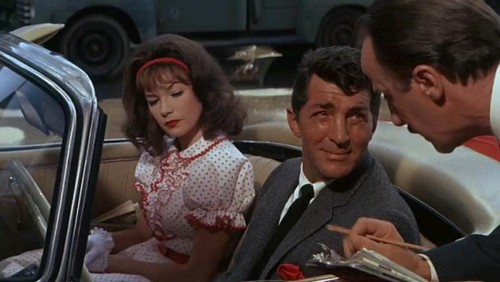
WHAT A WAY TO GO! (1964) – an unusual comedy headlining Shirley MacLaine as a four-time widow whose husbands get rich while married to her but then die untimely deaths in freak accidents. She’s clearly bad luck for them. Martin plays the hometown childhood sweetheart who waits patiently for her to come back. A very atypical role for him and he steals the show from such high-powered co-stars as Paul Newman, Gene Kelly and Robert Mitchum, as three of MacLaine’s husbands.

ROUGH NIGHT IN JERICHO (1967) – rugged western in which Martin plays a ruthless town boss opposed by ex-marshal George Peppard and stage line owner Jean Simmons. Here’s what I wrote in my viewing log after re-watching the film last year: “Gets contrived in the final section, but the buildup is excellent and the two stars are great. They play off each other very well. Peppard was very good at a certain kind of cold-blooded protagonist role. Dean’s the bad guy but he seems more human.” I often wonder what Martin’s film career would have been like if he’d stepped out of his comfort zone for roles like this more often.
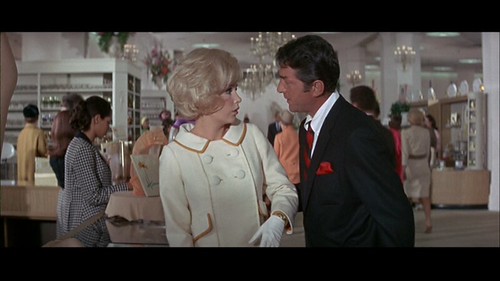
HOW TO SAVE A MARRIAGE AND RUIN YOUR LIFE (1968) – a funny romantic comedy in which Martin plays a bachelor trying to seduce his best friend’s mistress in order to save the man’s marriage. However, he’s working on the wrong woman and causes all kinds of complications. Martin and Stella Stevens have great chemistry. He starred in several films like this in the 1960s and I tend to think this one is the best. (He and Stevens are much better together here than they were in THE SILENCERS.)
Martin seemed less interested in a thriving film career than most of his contemporaries, including Sinatra, and, aside from RIO BRAVO and KISS ME, STUPID, he never really challenged himself the way Sinatra did (see FROM HERE TO ETERNITY, THE MAN WITH THE GOLDEN ARM, A HOLE IN THE HEAD, NONE BUT THE BRAVE and THE DETECTIVE) nor did he reinvent himself the way his sometime co-stars Burt Lancaster and Robert Mitchum did in the 1970s. At a certain point, Martin was more interested in his long-running TV show (1965-74) and, afterwards, the Dean Martin Celebrity Roasts, which began in 1974, lasted until 1979 and were revived briefly in 1984.
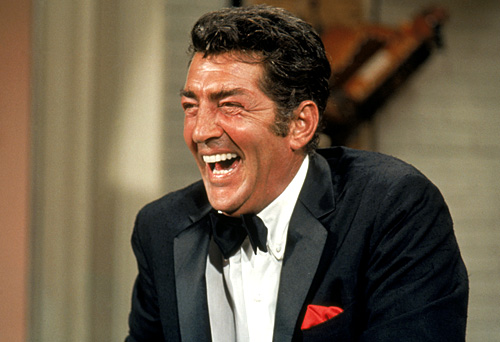
Martin also didn’t challenge himself musically the way Sinatra did. His songs were pleasant enough, but he didn’t take chances. He’d go into the studio and knock out a recording in one or two takes and then head out to the golf course. Sinatra would work over every line, every arrangement, every bit of musical phrasing till all hours, sometimes rousing the songwriter, no matter what time of night or what time zone they were in, if they needed to re-work a line. And if he didn’t feel he was getting the desired result, he would abandon the song and go on to the next one. Even well into the 21st century, I was telling myself I preferred Martin over Sinatra, but when I looked at my collection of albums, I found several albums by Sinatra and not one by Martin. And when I looked over my collection to find films with Sinatra for my centennial piece on him in December 2015, I had lots to choose from. When I looked over my collection for Martin, I found RIO BRAVO and THE SONS OF KATIE ELDER, the 4-film Matt Helm box set, and a comedy double feature (WHO WAS THAT LADY & HOW TO SAVE A MARRIAGE AND RUIN YOUR LIFE), and I really like only three of these eight films.
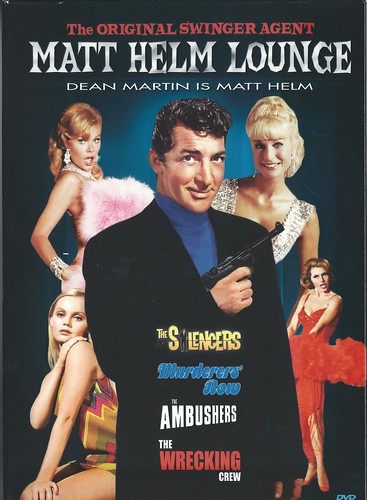
Still, while I admire and respect Sinatra for his accomplishments, I didn’t love him. I loved Martin and I believe it’s because he had a calming, soothing public image during a period when American pop culture was going through all kinds of upheavals. He seemed to be having a good time and wanted the same for us, the audience. He also didn’t take show biz institutions, or any other kind for that matter, very seriously. (He famously broke up with Jerry Lewis when he was told he would be cast as a uniformed policeman in their next movie. Recalling his run-ins with the law during his youthful delinquent days in Steubenville, Ohio, he refused to play a cop.) He was an adult who went his own way and seemed to indulge his vices without regret or repentance. He annoyed many of the more “responsible” adults of the time. I remember reading critical reviews of his TV show deriding his leering humor (“Moving hands are happy hands”). There was a freewheeling quality to his entertaining style that appealed to the kids of the era, at least to me.
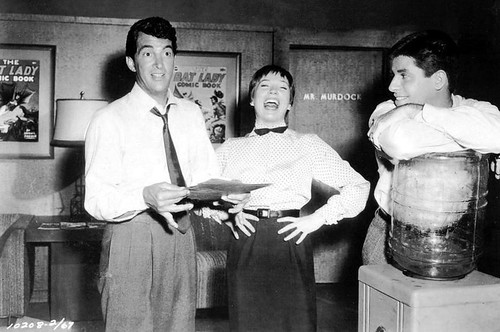
Shirley MacLaine, his frequent co-star, writes warmly about Martin in her 1995 book, My Lucky Stars: A Hollywood Memoir, published when Martin was still alive. She characterized him as a menefreghista (look it up). She devotes a chapter to Martin & Lewis and a chapter to Martin and Sinatra. She first worked with Martin on the Martin & Lewis comedy, ARTISTS AND MODELS (1955) and saw the clear signs of their impending breakup even then. It’s worth getting the book just for these chapters. Here’s a quote I like:
Frank wanted to socialize, tear up the town. Dean never liked going out at night. He liked to watch television and be alone. Many times I’d hear Dean say, “I can’t go out tonight. I have a girl in my room.” Of course, there was no one waiting for him but his faithful western or a rerun of Kojak.
Saying “no” to the Rat Pack ’cause you want to watch a western. I can relate to that.
Finally, I’d like to share a dream I had when I was in 6th Grade, one that reveals how I viewed Sinatra and Martin back in 1965. In the dream, Steve McQueen and Natalie Wood are having a nighttime picnic on a campground bordering the block in the Bronx where I lived. (In the dream, the campground is situated where the Metro-North railroad tracks are.) An alien spaceship lands on the street and two aliens get out and place McQueen and Wood in human-size Mason Jars and spirit them away, much to my horror. In the morning, still in the dream, I come downstairs from my apartment and my older brother Dennis is leaning against a car, with the railroad tracks back in their proper place in the middle of Park Avenue, and he points to a skinny little guy next to him and says something like, “Recognize this guy?” The figure is dark and hazy but gradually comes into focus and is none other than Frank Sinatra. Dean Martin comes up the block and joins us, towering over all of us. He’s about twice Sinatra’s size and he starts playing with Frank as if he’s a basketball, sort of dribbling him back and forth under his leg. I say, “I’m glad we’ve got Dean Martin to help us fight the aliens.”
Fortunately, we never had to call on him for such an emergency. But he did frequently save us from boredom and malaise. There are lots of clips of Dean’s TV performances on YouTube. Here’s one of Dean and Jerry performing on live TV with the Treniers, ca. 1954:
4 comments:
GREAT Dino-Bio! Lots of cool cool info & I dig his personal opinions, too. I always wondered how Franky felt 'bout the kidnappin' reference in "Kiss Me, Stupid". Surprised he didn't insist on it bein' yanked!
Hey pallie, likes Danny-o, it is so so refreshin' to find so so many Dino-devotees puttin' pen to paper to hugely homage our Dino on this centennial celebration of our Dino's descent to our planet. Keeps lovin' 'n sharin' our most beloved Dino!
A real treasure trove of Dean Martin pictures and info DMP! Thank you for a great and informative posting.
Scott
Hey pallie, likes Scotty-o, so so true man....marvelously massive in absolute awesome adulation of our most most beloved Dino. Keeps lovin' our main man!
Post a Comment